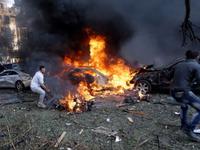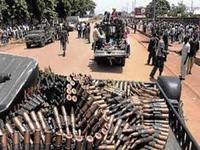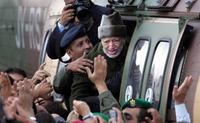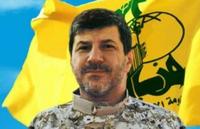-
Two U.K. terrorists plead guilty in U.S. court
Two British men who spent eight years fighting extradition to the United States have pled guilty to terrorism charges. Babar Ahmad, a 39-year-old south London resident admitted to charges of conspiracy and providing material support to terrorism. The case against both men is based on a Web site and terrorism support network that one of them operated in London. As one of the first Web sites promoting Jihadism in English, it played a pivotal role in spreading Jihadist propaganda as the movement began to develop in the West.
-
-
Hezbollah blames Israel, but assassinated leader had many enemies

Hassan al-Lakkis, the man considered to be Hezbollah’s tech expert, known for his expertise with drones, bombs, and other gadgets, was assassinated near his home last week. Al-Lakkis’s body was not yet cold when Hezbollah operatives began to blame Israel for the assassination, despite al-Lakkis’ long list of enemies. Hezbollah’s support of Syrian President Bashar al-Assad has gained it a long list of enemies, and many experts insist that the assassination of al-Lakkis does not resemble an Israeli-styled operation.
-
-
James Bond drank too much to perform at the level depicted in books, movies
A detailed examination of James Bond’s books shows that Bond’s weekly alcohol intake is over four times the recommended limit for an adult male, putting him at high risk of several alcohol related diseases, such as alcoholic liver disease, cirrhosis, impotence, and alcohol-induced tremor, and an early death. The medical team concluded that it would not be realistic to expect Bond to have the capacity to perform (in all aspects of life) at his high level of alcohol intake.
-
-
U.S. “bomb library” marks 10-year anniversary
It has been ten years since the FBI established the Terrorist Explosive Device Analytical Center (TEDAC), and since that time the multi-agency operation — sometimes referred to as America’s bomb library — has become an important tool in the nation’s fight against terrorism. Since its creation in 2003, TEDAC has examined more than 100,000 IEDs from around the world and currently receives submissions at the rate of 800 per month. Two million items have been processed for latent prints — half of them this year alone.
-
-
Africa’s Sahel region threatened by terrorism, organized crime: Ban Ki-moon
Terrorism, trafficking in arms, drugs, and people, and other transnational forms of organized crime are threatening security in Africa’s vast sub-Saharan Sahel region, Secretary-General Ban Ki-moon warned the Security Council yesterday. He called for continued strengthening of The UN Multidimensional Integrated Stabilization Mission in Mali (MINUSMA), a 12,600-strong force set up by the Council in April and authorized “to use all necessary means” to carry out security-related stabilization tasks, protect civilians, UN staff, and cultural artefacts in the cou8ntry, and create the conditions for provision of humanitarian aid.
-
-
Effectively modeling and profitably insuring terrorism risk
The insurance industry continues to explore ways to insure against terrorism risk, finding it a challenge despite developing various methodologies to measuring the likelihood of a terrorist attack. Terrorism experts in the insurance industry insist that because terrorism risk can be modeled, it can be effectively priced, and they note that several insurance companies are effectively modeling and profitably insuring terrorism risk today.
-
-
Texas terror case may hinge on reason for a FISA warrant
The Foreign Intelligence Surveillance Act (FISA), passed in 1978, was the center of a Fifth Circuit Court of Appeals trial last Thursday in New Orleans. The case involves Khalid Ali-M Aldawsari, a former Texas Tech student serving a life sentence for an attempted use of a weapon of mass destruction. At trial, federal prosecutors described Aldawsari as a “lone wolf” terrorist planning to wage a personal “holy war” from Lubbock, Texas. In the application for the warrants, however, prosecutors identified Aldawsari to a FISA court judge as an “agent of a foreign power.”
-
-
Prolonged viewing of terrorist incident media coverage tied to acute stress

Stepping away from the television, computer screen or smartphone in the aftermath of terrorist attacks or mass shootings may be beneficial to your mental health. This is the takeaway from a new study showing that six or more daily hours of exposure to media coverage of the Boston Marathon bombings in the week afterward was linked to more acute stress than having been at or near the marathon. Acute stress symptoms increased with each additional hour of bombing-related media exposure via television, social media, videos, print, or radio.
-
-
Is the time finally right for a pan-African security force?
Representatives of fifty-three African states, meeting at an African summit in Paris last week, emphasized the need for a pan-African military force. Observers note that this is not a new idea – it was first raised Ghana’s first president Kwame Nkrumah in 1963 — but that on those few occasions when efforts were made to translate the idea into reality, it has never worked. Notwithstanding the many failures of the past, and the many warning signs of the present, many African leaders and observers are optimistic that this time, the 50-year old dream of a pan-African military force may well be realized.
-
-
Game theory helps corporate risk manage analyze terrorism risks
The challenges of modeling and analyzing terrorism risk are based on the reality that the adversary is one who can alter where and when to strike and has the capability to counter-attack. Before 9/11, the science of risk modeling and analysis for corporations was primarily based on data accumulated from Mother Nature, a less responsive actor. Risk models have become more precise, but this increased precision notwithstanding, terrorists are likely to act in unexpected ways. To anticipate those unexpected ways, risk managers are relying on game theory, with the assumption that exploring hypothetical situations will prepare risk managers for the unexpected.
-
-
UN approves intervention in Central African Republic as violence rages

The UN Security Council yesterday voted for a resolution, put forward by France, which authorized an African Union-led peacekeeping force to intervene in the Central African Republic to prevent the growing chaos from causing the state to disintegrate. The AU force, with the support of French forces, will protect civilians, restore humanitarian access, and stabilize the country. UN officials have warned that the violence between the Christian majority and Muslim minority now in power could lead to genocide.
-
-
Stolen nuclear material found intact in Mexico
Mexican police yesterday said they have found a truck, a white 2007 Volkswagen cargo vehicle, which was stolen Monday by thieves who apparently were not aware that it was carrying toxic radioactive medical material from a hospital to a disposal site. The cobalt-60 the truck was carrying could be used to build a “dirty bomb.” The IAEA said that more than 100 incidents of thefts and other unauthorized activities involving nuclear and radioactive material are reported to the agency annually.
-
-
Yasser Arafat was not poisoned: French investigators

French scientific and medical experts rule out possibility that Palestinian leader was poisoned by radioactive polonium-210. A Russian medical team examining tissue samples taken from Arafat’s body reached the same conclusion three months ago. The conclusions of a Swiss medical team were more ambiguous. Leaders of the Palestinian Authority began accusing Israel of poisoning Arafat even before he died, as his health was rapidly declining. Israel has consistently denied the accusation, describing it as “unreasonable and unsupported by facts.”
-
-
Hezbollah No. 3 commander gunned down in Beirut

Hassan al-Laqees, regarded as the third or fourth most important leader of Hezbollah, was gunned down outside his home in Beirut last night. The Shi’a group blamed Israel for the assassination and warned that Israel would pay a price for the killing. Al-Laqees, who had served in various capacities in Hezbollah since the 1980s, was regarded by Western intelligence services as a brilliant technology and logistics officer. He was in charge of the organization’s arms development and acquisition, technology, and communication, and was heavily involved in operations. Analysts compare the operational blow to Hezbollah from al-Laqees’s assassination to the setback the organization suffered when Israeli agent killed Imad Mughniyeh, the then-operation chief of Hezbollah, in a daring covert operation in Damascus on 12 February 2008.
-
-
First no-fly list case goes to trial
Rahinah Ibrahim, dean of the architecture and engineering school at the University of Malaysia, took to trial on Monday her claim against the U.S. government for wrongfully listing her on the government’s no-fly list. Ibrahim has sought to clear her name since January 2005, when she was arrested at San Francisco International Airport. Similar lawsuits are pending across the country, but Ibrahim’s case is the first to go to trial. Ibrahim claims she was mistakenly placed on the no-fly list due to her national origin and Muslim faith.
-
- All
- Regional
- Water
- Biometrics
- Borders/Immig
- Business
- Cybersecurity
- Detection
- Disasters
- Government
- Infrastructure
- International
- Public health
- Public Safety
- Communication interoperabillity
- Emergency services
- Emergency medical services
- Fire
- First response
- IEDs
- Law Enforcement
- Law Enforcement Technology
- Military technology
- Nonlethal weapons
- Nuclear weapons
- Personal protection equipment
- Police
- Notification /alert systems
- Situational awareness
- Weapons systems
- Sci-Tech
- Sector Reports
- Surveillance
- Transportation
Advertising & Marketing: advertise@newswirepubs.com
Editorial: editor@newswirepubs.com
General: info@newswirepubs.com
2010-2011 © News Wire Publications, LLC News Wire Publications, LLC
220 Old Country Road | Suite 200 | Mineola | New York | 11501
Permissions and Policies
Editorial: editor@newswirepubs.com
General: info@newswirepubs.com
2010-2011 © News Wire Publications, LLC News Wire Publications, LLC
220 Old Country Road | Suite 200 | Mineola | New York | 11501
Permissions and Policies
